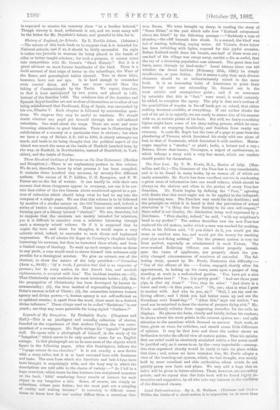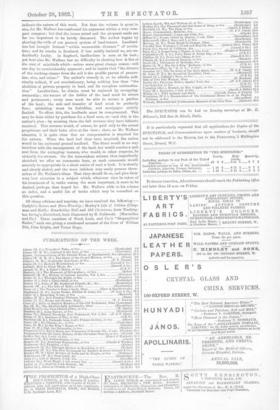Indicate the nature of this work. Not that the volume
is great in size, for Mr. Wallace has condensed his argument within a very com- pact compass ; but that the issues raised and the proposal made are far too important to be briefly discussed. The author begins by showing the evils of our present system of land-tenure. Landlord- ism has brought Ireland "within measurable distance" of revolu- tion; and its results in Scotland, if less noisily insisted on, are un- doubtedly faulty. In England, landlordism is seen at its best ; yet here also Mr. Wallace has no difficulty in showing how it lies at the root of mischiefs which—unless some great change comes—will one day be unmistakeably apparent ; and he insists that "the divorce of the working-classes from the soil is the prolific parent of pauper. ism, vice, and crime." The author's remedy is, as he admits, suffi- ciently radical, if not revolutionary, being nothing less than "the abolition of private property in land, and its complete nationalisa- tion." Landlordism, he thinks, must be replaced by occupying- ownership ; the tenure of the holder of the land must be secure and permanent; every man must be able to secure a portion of the land ; the sale and transfer of land must be perfectly free ; subletting must be forbidden, and mortgages strictly limited. To effect this, the landlords must be compensated. This may be done either by purchase for a fixed sum, or—and this is the author's plan—by securing them the full revenue they have hitherto received. This revenue would, of course, be paid only to the actual proprietors and their heirs alive at the time; since, as Mr. Wallace observes, it is quite clear that no compensation is required for the unborn. When the land had thus been acquired, the nation would be the universal ground landlord. The State would in no way interfere with the management of the land, but would reoeive a quit rent from the occupying tenants, who would, in other respects, be virtually the owners. On the tremendous scheme thus imperfectly sketched we offer no comments here, as such comments would scarcely be appropriate in a short notice of such a book. It is shortly and plearly stated, and the most indolent may easily possess them- selves of Mr. Wallace's ideas. That they should do so, and give their very best attention to a subject which, whatever view be taken of his treatment of it, ranks among the most important, is more to be desired, perhaps, than hoped for. Mr. Wallace adds to his volume an index, and a useful list of books which may be consulted on this question.



































 Previous page
Previous page